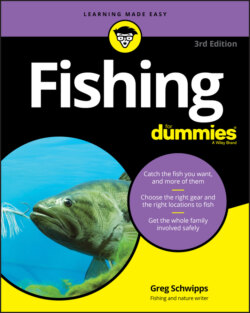Читать книгу Fishing For Dummies - Greg Schwipps - Страница 46
Tucking Your Fishing License in a Safe Spot
ОглавлениеFish are a natural resource, and as such, they belong to everyone and to no one. Actually, if you fish legally and catch a legal fish, then that fish belongs to you. But you still have to follow the rules. Fish populations are monitored and sometimes managed by your local Department of Natural Resources and Fish and Wildlife divisions, and their goal is to ensure healthy, well-balanced populations of fish. Those rules and laws governing wild game help maintain that balance, and Conservation Officers are the law enforcement branch of the DNR. When fishing, you may be visited by a Conservation Officer, and he or she might ask to see your license and inspect your gear.
Obviously, to prepare for this event, you need to have your license with you at all times. You also need to know the laws affecting the kind of fishing you are doing. Be courteous and let the officers do their job. They work to protect the same resources and places you love.
Carry your license in a waterproof container, or place your license in your wallet and your wallet in a sealed plastic bag.
Like anything governed by rules or laws, in fishing there are those who knowingly break the laws for their own gain. Most often this involves anglers taking more fish than they are legally allowed to keep, or catching fish using illegal methods. Most states have a toll-free number that you can call to report this sort of activity to Conservation Officers, and I recommend you do just that if you see someone wantonly breaking the fishing laws in your area. After all, a poacher is taking fish illegally — fish that you and other law-abiding citizens will no longer be able to catch. It is your right to report poaching.
